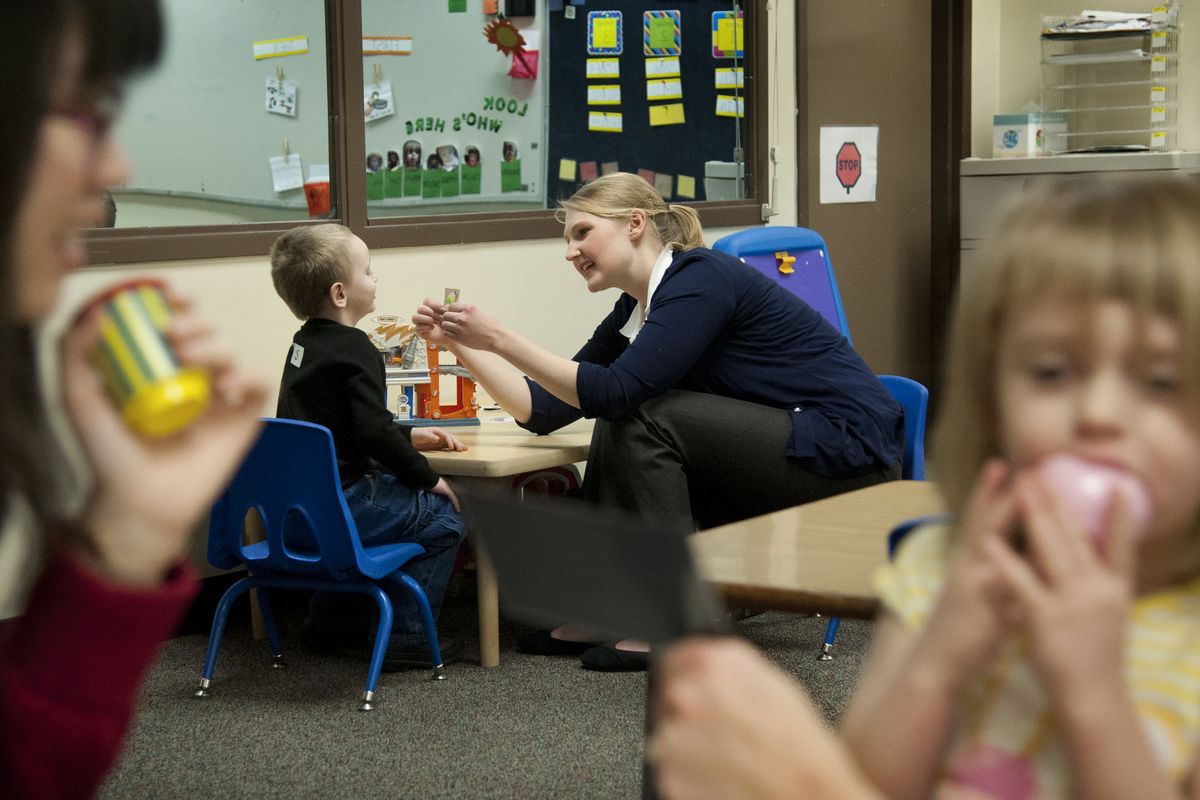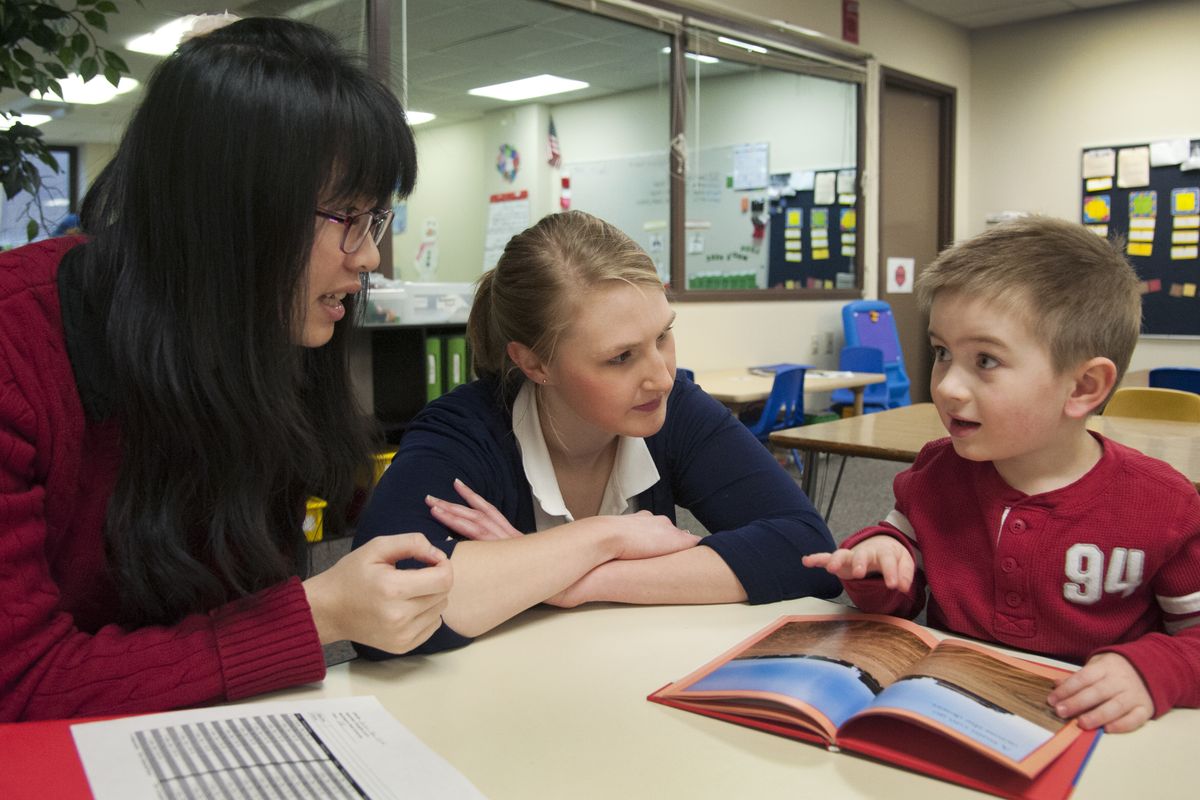Domino Project helps children with autism learn to thrive
Graduate student Lauren Burrows, back right, works with Sage Fast, 4, in Eastern Washington University’s autism early learning center as part of the Domino Project on Jan. 23 in Cheney. Graduate student Ming-Yeh Hsieh, foreground left, helps Abigail Green, 4, to handle drinking cups.
Gina Fast knew her twin boys weren’t like other children, but she couldn’t put her finger on exactly how they were different.
They had a difficult time transitioning from the bottle to baby food. They developed running and screaming episodes she couldn’t stop. Day care providers said they were out of control and turned them away.
When an alert pediatrician noticed the twins weren’t talking at an age-appropriate level, further tests led to a diagnosis of autism. By then, they were 2 1/2 years old.
“My kids look so normal. I was scrutinized to a point where I thought there was something wrong with me,” Fast said, sitting in the observation area connected to the Domino Project’s classroom in Martin Hall, on Eastern Washington University’s campus in Cheney. “It was hell until I found this program.”
The Domino Project is an early learning program for children with autism spectrum disorders that was launched by the Northwest Autism Center in 2005. Fast said her twins, now 4, are much happier and better-adjusted since joining the program.
“I heard ‘Hi, mommy’ for the first time last week,” Fast said.
The children are not the only learners in the classroom.
EWU’s and Washington State University’s speech pathology programs have collaborated for years, and graduate students from both schools work alongside teachers and instructors in the Domino Project, gaining hands-on experience and doing research as they finish their degrees.
Ming-Yeh Hsieh is from Taiwan and is a second-year graduate student in speech and hearing science.
She said most speech-language pathologists in Taiwan – where she plans to return – work with children in a clinic or a hospital, not in a classroom setting.
“This is my first experience working in a classroom, which is a much more natural setting for kids,” Hsieh said, adding that she believes the classroom setting helps the children use newly gained skills both in individual therapy sessions and at home.
Children with autism are often late speakers, said Dana Stevens, clinical director of the Domino Project.
“They don’t initiate speech, even if they know the words,” Stevens said, “so we are very focused on acknowledging and encouraging speech initiation.”
Seven children without autism participate in the class alongside eight children with autism.
“The children without autism become peer models,” Stevens said.
Children with autism behave very differently, and sometimes an autism diagnosis may cover other health issues like seizure disorders or developmental disabilities.
Dawn Sidell, executive director of the Northwest Autism Center, said “conventional discipline” – like a time-out – often doesn’t work with children with autism.
“It’s a big misconception that because you know one child with autism you are an expert in autism,” Sidell said. “Some may be behind in one developmental area yet ahead in another – they are just very different.”
The Domino Project takes those differences into account by having teachers work individually with the children and by meticulously keeping track of each child’s development.
“We know if something works or if it doesn’t,” Sidell said.
Lauren Burrows, a first-year graduate student in communication disorders, said the Domino Project allows her an opportunity to tie together the theories and research she’s studying with real-life experience.
“It also gives me an opportunity to see the impact a speech therapist can have on someone’s life,” Burrows said. “Every child here has different needs. Children with autism are often way more sensitive than their peers.”
Children in the project are between 2 and 5 years old, and Sidell said the model used for the program is uncommon.
“We may be the only clinic in Washington that combines speech and behavioral therapy,” Sidell said, “but it just makes sense.”
Children participate in the Domino Project five days a week for five hours, year-round. Families receive home visits and are offered respite care.
“It can be impossible to find a babysitter when you have autistic children,” Fast said.
With a staff-child ratio near 1-to-1, the program is expensive but support from EWU and WSU as well as grants makes it possible, Sidell said.
And more education on how to best help people with autism is desperately needed.
Stevens said day care providers and caregivers call almost daily asking for help dealing with a child with autism.
“You may not be planning on it, but you will encounter autism,” Stevens said. “Ninety percent of the speech pathology students here will have students with autism.”
For parents like Fast, just getting help understanding autism and learning how to work with her children is priceless.
“My children are so much more happy now that I understand them better,” she said. “People just don’t understand how hard it can be.”

